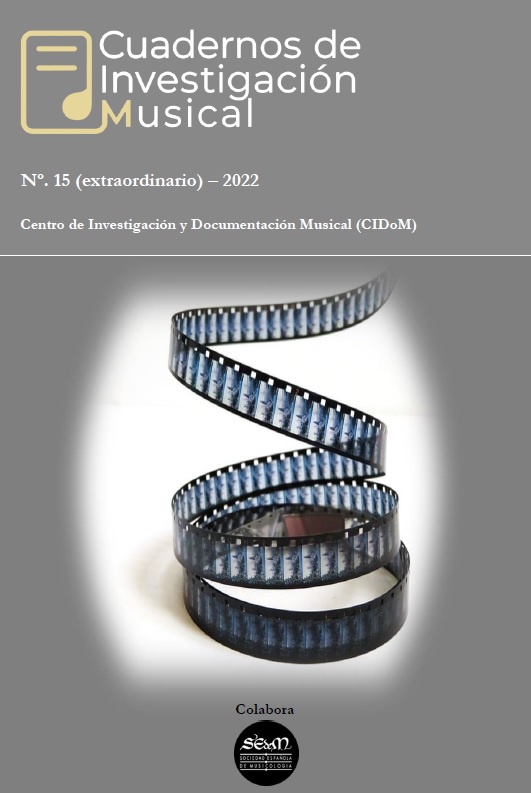Damsels Un-distressed Scoring Complex Women in HBO’s Westworld: The Maze (2016)
Main Article Content
Abstract
In the HBO series Westworld: The Maze (2016), two female characters, the “hosts” (androids) Dolores and Maeve, are not only compelling characters with whom the viewers engage with, they also subvert gender-bound tropes pervasive in the Western genre. This article will examine the role of the soundtrack in the construction and evolution of complex female characters in Westworld, giving due attention to Ramin Djawadi’s original compositions and how they interact with his piano arrangements of contemporary rock songs. Additionally, this article elucidates how the music constructs gender as a repeated, performed process by drawing on Judith Butler’s theories of gender performativity. Beyond adding musical interest to the series, this article argues that the score sonically manifests the complex negotiations of gender and power that underlie Westworld’s first season.
Article Details
Los autores de los artículos mantienen el copyright, no recibirán ninguna contraprestación económica por el trabajo y el mismo siempre será reconocido como exclusivamente suyo. La revista se compromete a proteger la integridad y originalidad del artículo, así como los derechos de autor que correspondan. Los autores son los únicos responsables del material, textos e imágenes que utilizan en sus respectivos trabajos, debiendo respetar siempre los derechos de autor de terceras personas, por lo que la revista no se hace responsable de lo contenido en este tema respecto al trabajo de los autores.
References
Butler, J. (2006). Gender Trouble: Feminism and the Subversion of Identity. New York: Routledge.
D’Addario, D. (2016). Why HBO’s Westworld Is Fall’s Most Promising Drama. Time. Retrieved from https://time.com/4512789/hbo-westworld-review/
Dockterman, E. (2016). Women Now Rule Westworld. But Was It Worth It?. Time. Retrieved from https://time.com/4589310/westworld-finale-dolores-maeve/
Dow, B. J. (1996). Prime-Time Feminism: Television, Media Culture, and the Women’s Movement since 1970. Philadelphia: University of Pennsylvania Press.
Edgar, G. J. (2020). Hearing Hollywood Women: Music and Gender in Action Films, 1950s–1980s (PhD dissertation). Harvard University.
Emami, G., & Riesman, A. (2016). Westworld’s Creators on How They Feel About Fan Theories, and What They’ll Do Differently in Season Two. Vulture. Retrieved from https://www.vulture.com/2016/12/westworld-creators-on-fan-theories-and-season-2.html
Fülöp, R. N. (2012). Heroes, Dames, and Damsels in Distress: Constructing Gender Types in Classical Hollywood Film Music (PhD dissertation). University of Michigan.
Hilleary, M. (2016). “Westworld” Composer Ramin Djawadi on Why Those Radiohead Covers Keep Coming. Pitchfork. Retrieved from https://pitchfork.com/thepitch/1370-westworld-composer-ramin-djawadi-on-why-those-radiohead-covers-keep-coming/
Köller, S. (2019). “I imagined a story where I didn’t have to be the damsel”: Seriality, Reflexivity, and Narratively Complex Women in Westworld. Zeitschrift für Anglistik und Amerikanistik, 67(2), pp. 163-180.
Marshall, K. (2019). Music as a Source of Narrative Information in HBO’s Westworld. In A. Goody & A. Mackay (Eds.), Reading Westworld (pp. 97-118). Cham: Palgrave Macmillan.
Mehring, F. (2018). Westworld: Die musikalische DNA des Posthumanismus. In B. Georgi-Findlay & K. Kanzler (Eds.), Mensch, Maschine, Maschinenmenschen (pp. 41-51). Wiesbaden: Springer.
Mullen, E. (2018). “Not Much of a Rind on You”: (De)Constructing Genre and Gender in Westworld (Joy and Nolan, 2016-). TV/Series, 14. Retrieved from http://journals.openedition.org/tvseries/3304
Paulus, I. (2000). Williams versus Wagner or an Attempt at Linking Musical Epics. International Review of the Aesthetics and Sociology of Music, 31(2), pp. 153-184.
Pinedo, I. C. (2021). Difficult Women on Television Drama: The Gender Politics of Complex Women in Serial Narratives. New York: Routledge.
Renfro, K. (2016). Here’s Why Modern Songs Play on the Saloon’s Piano in “Westworld.” Insider. Retrieved from https://www.insider.com/westworld-piano-songs-2016-10
Sebastián Martín, M. (2018). All the Park’s a Stage: Westworld as the Metafictional Frankenstein. ES Review. Spanish Journal of English Studies, 39, pp. 51-67.
Smith, J. (1998). The Sounds of Commerce: Marketing Popular Film Music. New York: Columbia University Press.
Warshow, R. (1974). Movie Chronicle: The Westerner. In G. Mast & M. Cohen (Eds.), Film Theory and Criticism: Introductory Readings (pp. 401-416). New York: Oxford University Press.
Waugh, P. (1984). Metafiction: The Theory and Practice of Self-Conscious Fiction. New York: Methuen.
Wigler, J. (2016). Evan Rachel Wood on “Westworld” Violence Against Women: “Wait for the Context.” The Hollywood Reporter. Retrieved from https://www.hollywoodreporter.com/tv/tv-news/westworld-evan-rachel-wood-premiere-934228/
Wilkins, K. (2019). These Violent Delights: Navigating Westworld as “Quality” Television. In A. Goody & A. Mackay (Eds.), Reading Westworld (pp. 23-41). Cham: Palgrave Macmillan.
Media
Nolan, J. & Joy, L. (Creators). (2017). Westworld. Season 1: The Maze [DVD]. Warner Home Video.
Nolan, J. & Joy, L. (2017). Special Features: Crafting the Narrative. In J. Nolan & L. Joy (Creators), Westworld. Season 1: The Maze [DVD]. Warner Home Video.
Nolan, J., Joy, L. & Djawadi, R. (2017). Special Features: The Key to the Chords. In J. Nolan & L. Joy (Creators), Westworld. Season 1: The Maze [DVD]. Warner Home Video.
